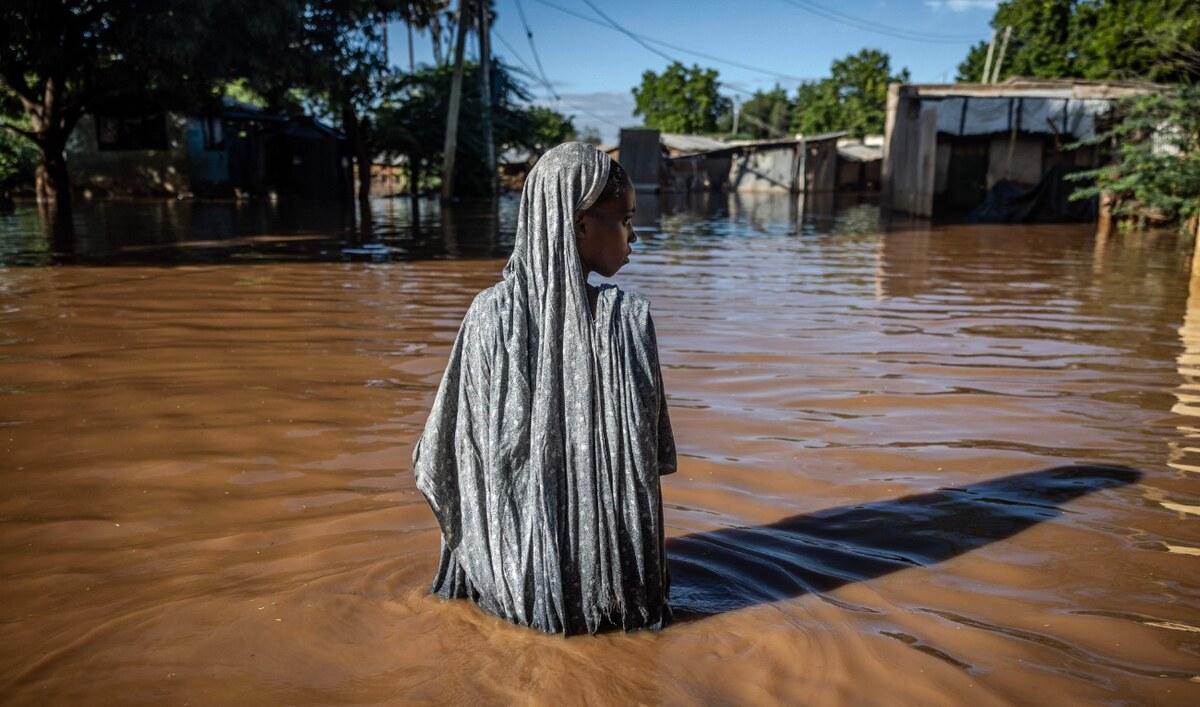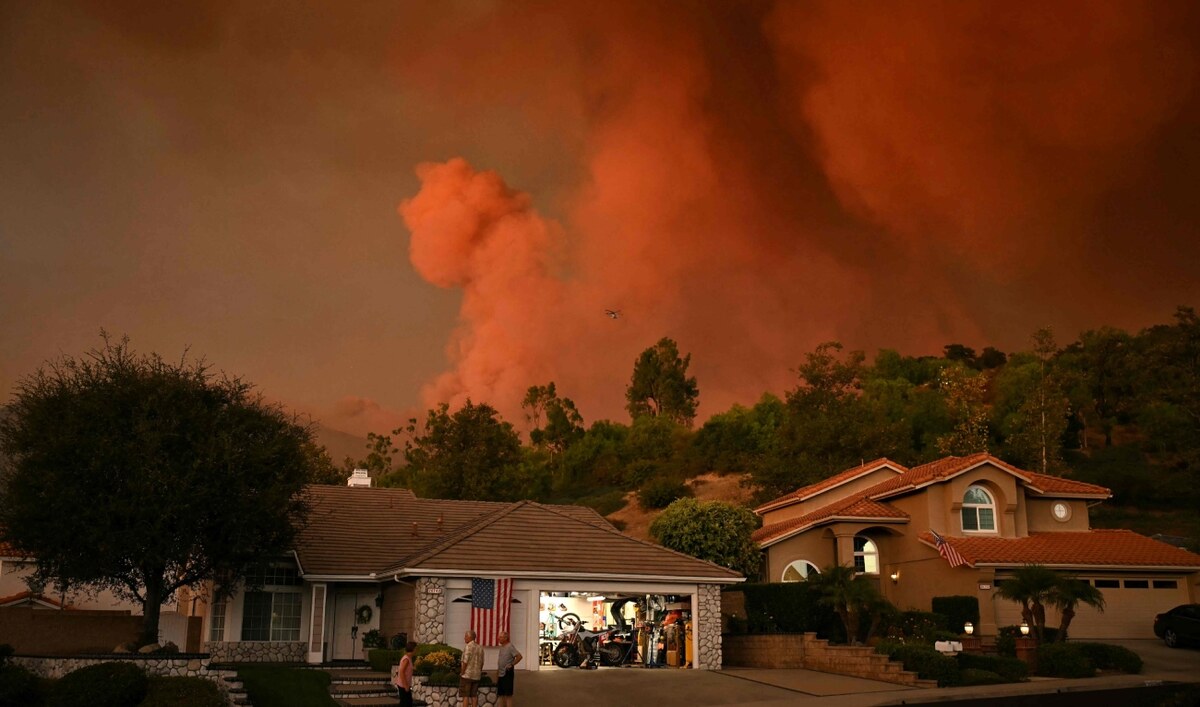LONDON/MEXICO CITY: Intolerable heat. Unsurvivable storms. Inescapable floods.
In 2024, billions of people across the world faced climatic conditions that broke record after record: logging ever more highs for heat, floods, storms, fire and drought.
As the year drew to a close, the conclusion was both blatant and bleak: 2024 was the hottest year since records began, according to European climate scientists.
But it may not hold this dubious honor for long.
“This is life now and it’s not going to get easier. It’s only going to get harder. That’s what climate change means,” said Andrew Pershing, chief programs officer at Climate Central, a US-based non-profit climate advocacy group.
“Because we continue to pollute the atmosphere, we’re going to get, year after year, warmer and warmer oceans, warmer and warmer lands, bigger and badder storms.”
Others use still bolder language.
“We are on the brink of an irreversible climate disaster,” said the 2024 State of the Climate report.
Here’s how that looked this year, what 2025 holds, and why there are still reasons to be hopeful.
SOS
This was the first year when the planet was more than 1.5 degrees Celsius hotter than it was in the 1850-1900 pre-industrial period, a time when humans did not burn fossil fuels on a mass scale, according to the European Union’s Copernicus Climate Change Service.
The sheer number of days of extreme heat endured by billions of people — from the desert town of Phoenix, Arizona to the desert town of Phalodi in India’s Rajasthan — was startling.
Sunday, July 21, was the hottest day ever.
Until Monday, July 22.
The day after dipped a smidgen cooler.
These consecutive records came during Earth’s hottest season on record — June to August — according to Climate Central.
Those three months exposed billions of people to extreme heat, heavy rain, deadly floods, storms and wildfires.

A woman wades through flood waters at an inundated residential area in Garissa, Kenya, on May 9, 2024. (AFP)
Friederike Otto of World Weather Attribution, a global team that examines the role of climate change in extreme weather, said heatwaves were a “game changer.”
The world has not caught up: many deaths go unrecorded while some African countries lack an official definition for a heatwave, meaning heat action plans don’t kick in, she said.
“There is a huge amount of awareness that needs to be had to even adapt to today’s heat extremes but, of course, we will see worse,” Otto told the Thomson Reuters Foundation.
Between June 16-24, more than 60 percent of the world’s population suffered from climate change-driven extreme heat.
This included 619 million in India, where more than 40,000 people suffered heatstroke and 100+ died over the summer.
Birds fell from the sky as temperatures neared 50 C (122 F).
Millions were affected: from China to Nigeria, Bangladesh to Brazil, Ethiopia to Egypt, Americans and Europeans, too.
Climate Central said one in four people had no break from exceptional heat from June to August, the highs made at least three times more likely by climate change.

Smoke billows from the Airport Fire in Rancho Santa Margarita, California, US, on September 9, 2024. (AFP)
During those months, 180 cities in the Northern Hemisphere had at least one dangerous extreme heatwave — a phenomenon made 21 times more likely by human action, Climate Central said.
TOO HOT TO WORK
“The number of days where you are starting to push the physiological limits of human survival (are rising),” said Pershing, citing Pakistan and the Arabian Gulf as two areas that neared breaking point this year.
Hundreds died during the Hajj pilgrimage to Makkah as Saudi Arabia topped 50 C (122 F).
In the US Midwest and Northeast, Americans broiled under a heat dome when high pressure trapped hot air overhead.
NASA’s Earth Observatory said extreme heat was often exacerbated by hot nights, a dearth of green space or air con, or a surfeit of concrete, which absorbs heat.
Heat and drought fueled wildfires this year, with blazes in the Mediterranean, United States and Latin America. Fires burned from the Siberian Arctic to Brazil’s Pantanal wetlands.
“(The Pantanal) is a wet area that is not supposed to burn for months on end so that is probably something I would look out for next year where we see wildfires in ecosystems that are not traditionally burning ecosystems,” said Otto.
THE MOST VULNERABLE
The “new normal” hits the vulnerable hardest.
“The people who are succumbing to heat-related deaths are not the millionaires and billionaires,” said Pershing.
“If you are a reasonably well-to-do person you can afford air conditioning, you have a vehicle that can get you where you need to go, you have ways to keep yourself cool. If you don’t have access to these things or you lose them because of a power outage or another storm, that creates these additional vulnerabilities.”

This aerial photo shows a fisherman collecting dead fish, caused by renovation works and ongoing hot weather conditions, from a reservoir in southern Vietnam's Dong Nai province on April 30, 2024. (AFP)
In Africa, nearly 93 percent of the workforce faces extreme heat.
On the Arabian Peninsula, it is more than 83 percent of workers.
European and Central Asian workers could be next in line.
For Otto, the answer to this fast-spreading risk lies in empathy, putting the poor and vulnerable — “the vast majority of the global population” — at the center of climate action.
“In Bangladesh, when you put the survival of the poorest in the center of the action, you actually have a society that is really well-equipped to deal with tropical cyclones,” she said.
“People know what to do and there are drills and practices.”
Silver linings, though, are rare.
“Empathy is in short supply,” said Otto.
BOILING SEAS
Ocean temperatures also hit alarming levels in 2024, wreaking havoc on land and sea.
Hurricane Milton came barely two weeks after Hurricane Helene, with abnormally warm waters in the Gulf of Mexico turbo-charging the twin storms that lashed the US Southeast.
“In that some places in the Gulf of Mexico ... temperatures were 400 times more likely because of climate change,” Pershing said.
Climate Central found a similar link between October’s floods in Spain and unusually warm waters in the Tropical Atlantic.
Human-driven climate change made these elevated sea surface temperatures up to 300 times more likely, Climate Central said.
“WE NEED DRILLS”
Otto said this year’s extremes, notably Europe’s floods, illustrated a “failure of imagination” and a refusal to adapt.
“We don’t just need the weather forecast or warnings. We need drills. We have to practice survival wherever heavy floods can happen and they can happen everywhere,” she said.
Infrastructure also failed.
“The way that we have canalized rivers and sealed all the surfaces ... will mean disastrous damages every time there is a flood ... There is always this short-termism that it’s expensive to fix it now but of course it will save lots of money and livelihoods later,” she said.
For Pershing, adaptation is “an exercise in imagination because we haven’t seen these kinds of events before ... That is the challenge of climate change: we’re going to be confronted year after year with conditions we’ve never experienced.”
SO WHAT NEXT?
Nobody expects a quick end to extreme weather but Otto is hopeful that humans may change their polluting ways.
“That is a reason for optimism ...clinging to fossil fuels (is) increasing inequality and destroying livelihoods but it increasingly makes less sense ...for national economies.”
In another upbeat note, Otto said better preparations in Europe meant fewer deaths in this year’s floods than previously.
But ocean temperatures are a key concern for 2025.
“The amount of heat stored in the ocean … really has my attention because we are not quite sure if there is something different going on in the climate system,” said Pershing.
Another risk — complacency.
“People do have a way of getting used to conditions and you can kinda get numb to it,” Pershing said.
And complacency can breed paralysis.
“This was the hottest year, last year was the hottest year — probably next year will be the hottest year again,” said Otto.

























